-
-
FeaturesRecursosFiturCaracterísticas精选功能精選功能المزايا
-
SolutionsSoluçõesSolusiSoluciones解决方案解決方案الحلول
-
IntegrationsIntegraçõesIntegrationsIntegraciones集成平台整合دمج مع تطبيقات أخرى
-
Affiliate/PartnersAfiliados/ParceirosAfiliasi/MitraAfiliados/Partners联盟/合作伙伴聯盟/夥伴شريك
-
ResourcesRecursosSumber dayaRecursosالموارد

Top WhatsApp API Providers in 2024: A Comparative Analysis
WhatsApp, with an almost 3 billion user base, is now becoming the go-to platform for business communication, and companies are turning to WhatsApp API providers to leverage this platform.
To facilitate this, numerous WhatsApp API Providers have emerged, each offering unique features and capabilities.
In this blog post, we will explore three such providers: Twilio, MessageBird, and Zendesk, and compare them with one of the best in the market, Wati.
Twilio’s WhatsApp API Falls Short of Expectations
Twilio, an American cloud communications platform and a leading WhatsApp business API provider, has ventured into the realm of WhatsApp business solutions with a compelling set of features. Its API for WhatsApp is laudable for its simplicity, allowing developers to effortlessly integrate their systems with WhatsApp. Twilio’s pay-as-you-go pricing model is an attractive prospect for many businesses, allowing them to scale as they grow.
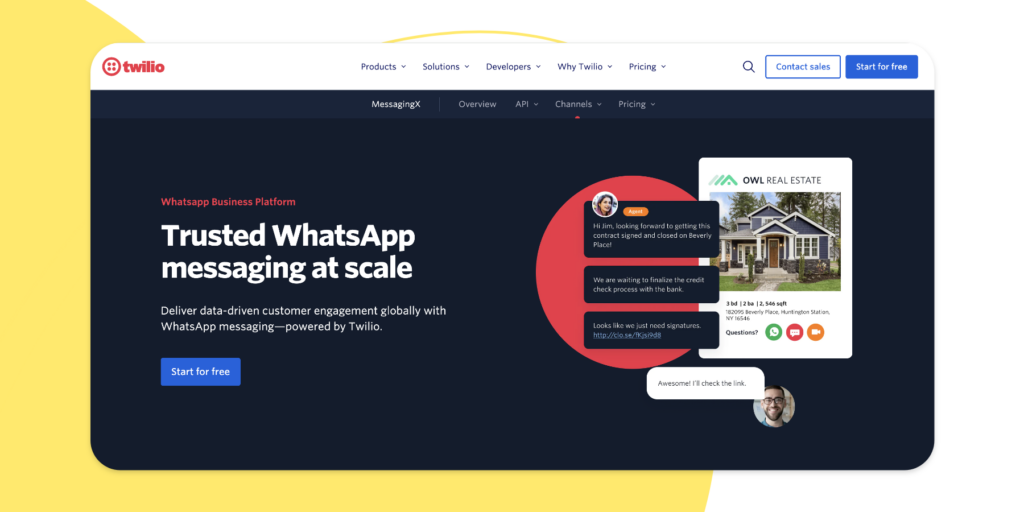
However, Twilio has its limitations.
1. Technical Expertise Required: Implementing Twilio’s WhatsApp API or creating a WhatsApp Chatbot may require technical expertise or developer assistance. This is mainly because Twilio has a no-code interface which involves a fair bit of coding. This can be a challenge for non-technical business owners or small businesses without dedicated technical teams, potentially limiting accessibility.
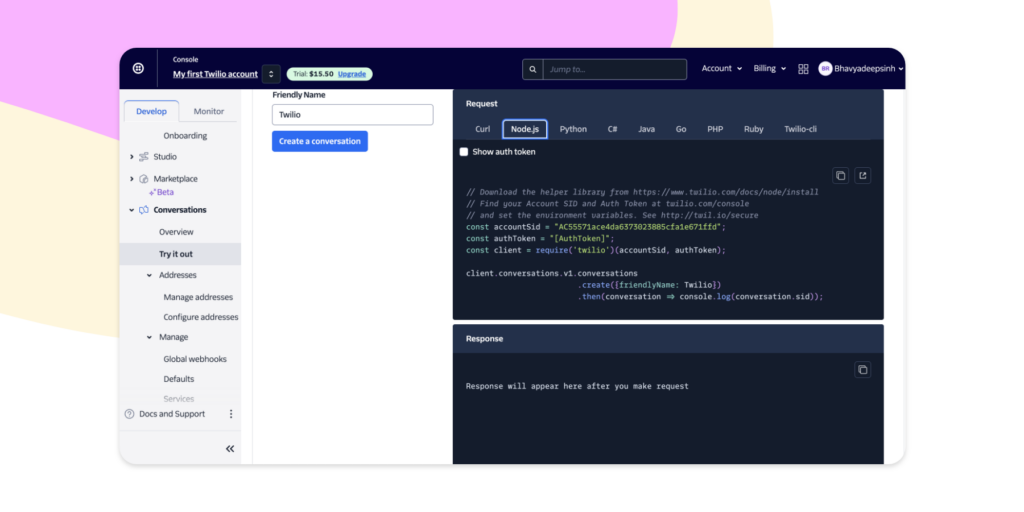
2. Lack of Built-in CRM: Twilio’s WhatsApp API does not come with a built-in Customer Relationship Management (CRM) system. As a result, businesses need to invest in a separate CRM tool to manage customer interactions, which can add complexity and cost.
3. Limited Customer Support: Twilio’s customer support may fall short for businesses seeking extensive guidance and assistance, as it primarily offers basic support. Additionally, Twilio currently lacks a mobile app for WhatsApp Business services, which limits its accessibility and ease of use. These factors combined might make Twilio less appealing WhatsApp API provider to businesses requiring more comprehensive support and mobile accessibility.
4. Scalability Challenges: Twilio has certain limitations when it comes to scaling WhatsApp messaging. The default messaging throughput is capped at 80 messages per second (MPS) per WhatsApp sender for outbound traffic. While this can be increased to 400 MPS for text-only messages, it requires approval upon review of the business’s messaging requirements.
If messages are sent at rates exceeding the configured throughput, they are queued for delivery, but the queue has a maximum limit of four hours. Messages remaining in the queue for more than four hours will fail. To distribute high message volumes, businesses need to use Messaging Services to spread traffic across multiple senders.
In contrast, official WhatsApp API providers like Twilio do not have a daily cap on messages sent, as they are pay-as-you-go services. However, WhatsApp does impose tiers on the number of unique message recipients per day as businesses ramp up their usage.
Overall, Twilio’s WhatsApp API offers a solid foundation for businesses to leverage the power of WhatsApp for their communication needs. However, the technical expertise required and the absence of a built-in CRM system might act as drawbacks for some businesses.
MessageBird’s Promising Features Hindered by Complexity and Pricing
Hailing from the Netherlands, this WhatsApp API provider offers a robust platform that integrates seamlessly with WhatsApp. Its omnichannel capabilities ensure that businesses can manage multiple communication streams in a centralized location. Also, MessageBird offers a feature-rich, built-in CRM, enabling businesses to maintain a comprehensive database of their customers.
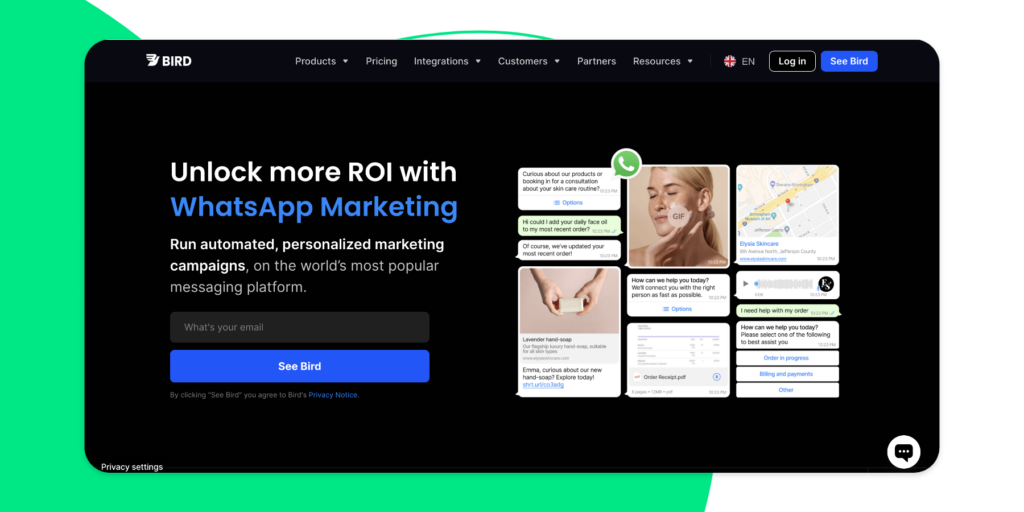
On the downside, MessageBird’s API is quite complex compared to other WhatsApp API providers, necessitating a steep learning curve for developers. It’s pricing, while competitive, can still be prohibitive for smaller businesses.
- Complex API: MessageBird’s API for WhatsApp can be quite complex, requiring a steep learning curve for developers. This complexity may pose a challenge for businesses lacking technical expertise or dedicated development resources.
- Pricing Limitations: While MessageBird offers competitive pricing, it may still be prohibitive for smaller businesses with limited budgets. The cost of using MessageBird’s WhatsApp Solutions might not align with the financial capabilities of all businesses.
- Lack of Customization: MessageBird’s WhatsApp Solutions may have limitations in terms of customization options. Businesses seeking highly tailored and personalized communication experiences may find the platform’s customization capabilities restrictive.
- No Free Trial: Another drawback is that MessageBird does not offer a free trial specifically for its WhatsApp Business API service. While it provides a free trial with €10 credit for new users to explore other MessageBird services, this may not be sufficient for businesses to fully evaluate the WhatsApp API features and capabilities.
In summary, while MessageBird’s WhatsApp Solutions showcase omnichannel capabilities and a built-in CRM system, they fall short in certain areas. The complex API, potential pricing limitations, and limited customization options may hinder the overall user experience and suitability for businesses with specific needs.

Unmasking Customer Support Shortcomings of Zendesk
Zendesk, a renowned customer service software company, has a WhatsApp Business Solution that is easy to use and integrates smoothly with other Zendesk solutions. This WhatsApp API provider’s key strength lies in its powerful customer support features, making it a good fit for businesses with high customer interaction.
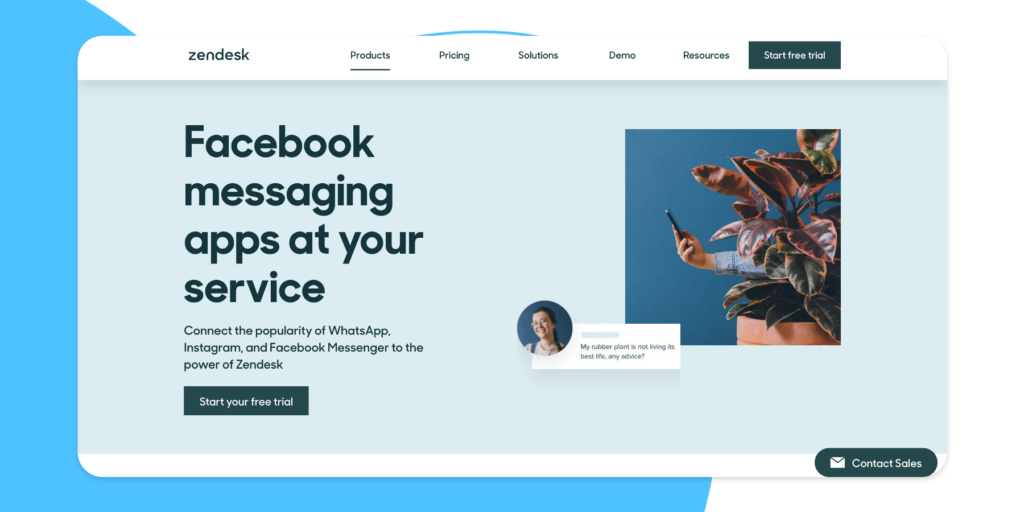
However, similar to Twilio, Zendesk doesn’t offer a built-in CRM for WhatsApp, leading to additional expenses for businesses. Also, its WhatsApp Business Solution is part of a larger suite, which could be overwhelming for businesses seeking a simple, standalone WhatsApp solution.
- Lack of Built-in CRM: Zendesk’s WhatsApp Business Solution does not offer a built-in Customer Relationship Management (CRM) system. Businesses must rely on external tools or invest in additional CRM software, adding complexity and potential integration challenges.
- Overwhelming Suite of Tools: Zendesk’s WhatsApp Business Solution is part of a larger suite of software offerings. This comprehensive approach may be overwhelming for businesses seeking a simple, standalone WhatsApp solution, potentially leading to unnecessary complexity and costs.
- Cost Considerations: Zendesk’s pricing structure may not be suitable for all businesses, particularly smaller or budget-constrained companies. The cost of utilizing Zendesk’s WhatsApp Business Solution might exceed the financial capabilities of certain businesses.
- Complex Setup Process: The setup process for WhatsApp integration with Zendesk involves several steps, including creating a Meta Business Manager and connecting multiple WhatsApp Business Accounts to a single Zendesk account.
In conclusion, while Zendesk’s WhatsApp Business Solution emphasizes customer support and integration with its suite of software, it falls short in several aspects. The lack of a built-in CRM system, the overwhelming suite of tools, and potential cost considerations may present challenges and limitations for businesses considering Zendesk as their WhatsApp solution provider.
Wati: A Game Changing WhatsApp API Provider
Wati distinguishes itself by addressing the key shortcomings of Zendesk, Twilio, and MessageBird, offering a more streamlined and user-friendly WhatsApp API solution.
Unlike Twilio, Wati requires minimal technical expertise and includes a built-in CRM, simplifying customer relationship management and reducing costs.
Its straightforward API, unlike MessageBird’s complex interface, is easy to implement, with a pricing model that suits small and medium-sized businesses.
Additionally, Wati focuses solely on WhatsApp solutions, avoiding the overwhelming suite of tools seen with Zendesk, providing a robust yet simple communication platform for businesses.
Discover Why Wati is the Best WhatsApp API Provider
Pros of using Wati’s WhatsApp Business Solution:
1. User-Friendly Interface: Wati sets itself apart with its intuitive and user-friendly interface. The platform is designed to cater to users of all technical backgrounds, making it accessible and easy to navigate. Businesses can quickly adapt and harness the power of WhatsApp without the need for extensive technical expertise.
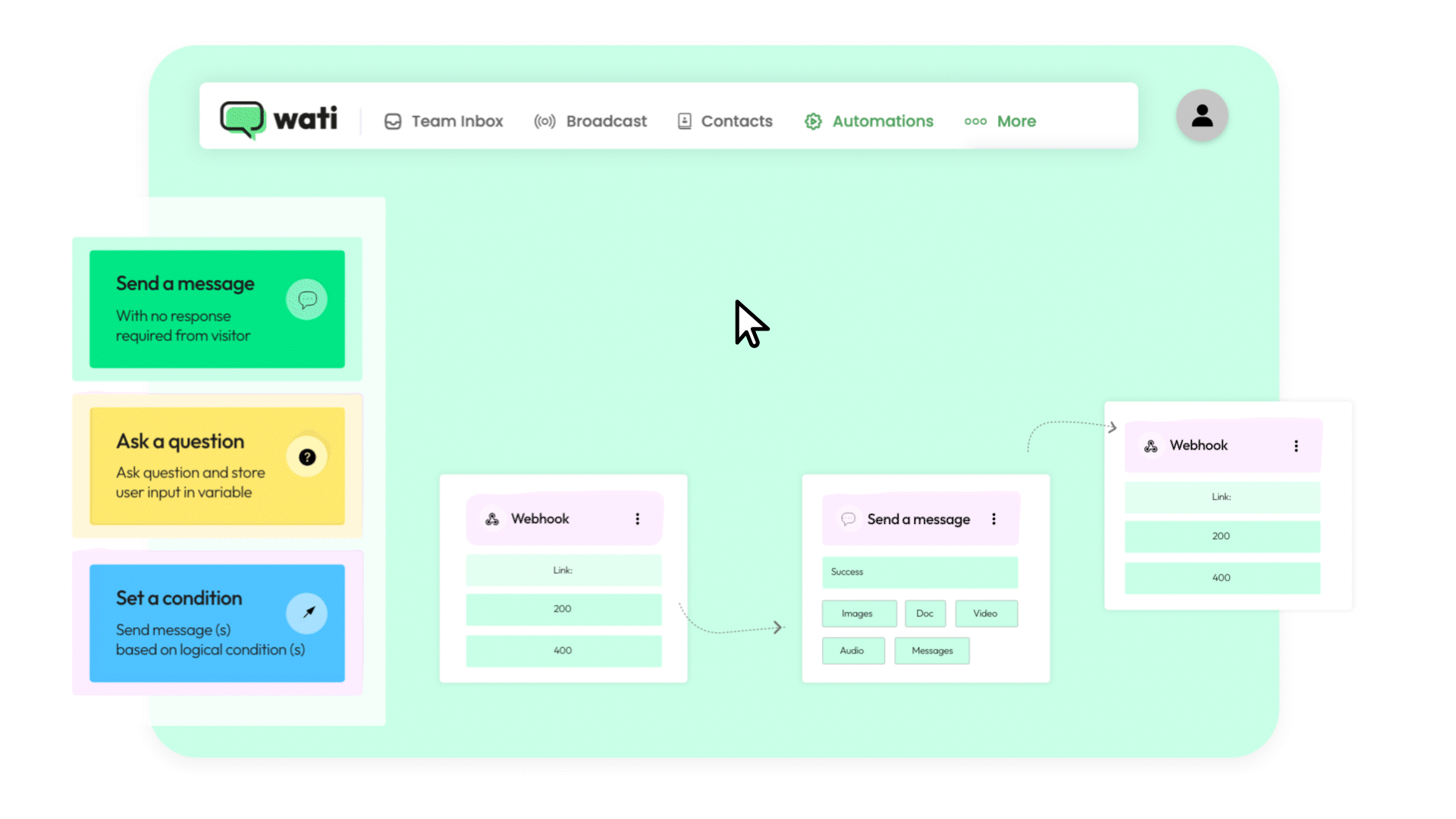
2. Comprehensive Suite of Features: Wati offers a comprehensive suite of features that cater to diverse business needs. From seamless integration with existing systems to Shared Team Inbox, Click-to-WhatsApp Ads, Custom Notifications, Catalog, to advanced messaging capabilities and automation of Broadcast & Bulk Messages, Wati provides a versatile toolkit for businesses to maximize their WhatsApp communication.
3. Built-in CRM for Efficient Customer Management: Wati’s WhatsApp Business Solution includes a built-in Customer Relationship Management (CRM) system. This integration enables businesses to streamline customer management directly from the platform, eliminating the need for separate CRM tools. The built-in CRM empowers businesses to track and manage customer interactions, resulting in enhanced customer relationships.
4. Competitive Pricing Model: Wati adopts a competitive pricing model, ensuring that businesses of all sizes can leverage its powerful WhatsApp solution without breaking the bank. The affordability makes Wati an attractive option, especially for small and medium-sized enterprises looking for a cost-effective yet robust WhatsApp Business Solution.
5. Exceptional Customer Support: Wati distinguishes itself by offering exceptional customer support. Their dedicated team is available round-the-clock to provide prompt assistance, troubleshoot issues, and guide businesses through the implementation and usage of the WhatsApp solution. This high-level support ensures smooth operation and customer satisfaction.
In summary, Wati shines as a game-changer in the WhatsApp Business Solution arena. Its user-friendly interface, comprehensive feature set, built-in CRM, competitive pricing, and outstanding customer support set it apart from the competition. Wati’s dedication to empowering businesses with an exceptional WhatsApp communication platform cements its position as a leader in the industry.
Conclusion
While Twilio, MessageBird, and Zendesk offer commendable WhatsApp Business Solutions, they each come with their own set of limitations. Wati, on the other hand, offers a well-rounded solution that caters to a wide range of business needs.
Its user-friendly API, built-in CRM, competitive pricing, and exceptional customer support make it one of the best WhatsApp Business Solution Providers in the world. As businesses continue to evolve in their communication practices, providers like Wati will play an increasingly significant role in driving success.
Frequently Asked Questions
1. What factors should businesses consider when choosing a WhatsApp API Provider?
1. Ease of Integration
How smoothly can the WhatsApp API connect with your existing business systems? Look for providers offering pre-built connectors or well-documented APIs for developers.
A user-friendly interface for managing contacts, messages, and campaigns is also a plus.
2. Customer Support
Reliable customer support is essential, especially during initial setup and troubleshooting.
Consider factors like response times, available support channels (phone, email, live chat), and the provider’s expertise in WhatsApp Business solutions.
3. Pricing Models
There are various pricing structures – per message, monthly subscription, or tiered plans based on message volume.
Choose a model that aligns with your business needs and budget. Be wary of hidden fees and ensure transparent pricing.
4. Scalability Options
As your business grows, your WhatsApp communication needs will too. Look for a provider whose API can scale to accommodate increasing message volume and user base.
5. Essential Features
Built-in CRM systems: Manage customer interactions effectively by integrating your WhatsApp communication with a CRM system within the API. This allows you to store customer data, track communication history, and personalize interactions.
Omnichannel capabilities: Provide a seamless customer experience by allowing conversations to flow between WhatsApp and other communication channels (email, SMS, etc.) offered by the provider.
By carefully evaluating these factors, businesses can choose a WhatsApp API provider that empowers them to connect with customers on their preferred platform and streamline communication workflows.
2. How can businesses ensure the security and privacy of their communications while choosing a WhatsApp API provider?
Businesses using WhatsApp Business API Solutions must prioritize security and privacy. Look for providers offering end-to-end encryption, a cornerstone of secure communication. But security goes beyond that. Opt for providers with robust data storage practices, adhering to data protection regulations.
Furthermore, train your employees on data handling and implement two-factor authentication for added security. Consider solutions for monitoring suspicious activity and data breaches. By prioritizing these aspects, businesses can ensure a secure WhatsApp environment for themselves and their customers.
3. What types of businesses benefit most from using WhatsApp Business API Solutions?
Businesses with high customer interaction, such as e-commerce, customer service-oriented companies, and those needing real-time communication with their customers, can significantly benefit from using WhatsApp Business Solutions.
4. What is the process for migrating from one WhatsApp API Provider to another?
Migrating from one WhatsApp API provider to another typically involves exporting and importing contact lists, setting up new API integrations, configuring messaging templates, and ensuring data compliance. Businesses should also seek support from the new provider to facilitate a smooth transition.
Latest Comments